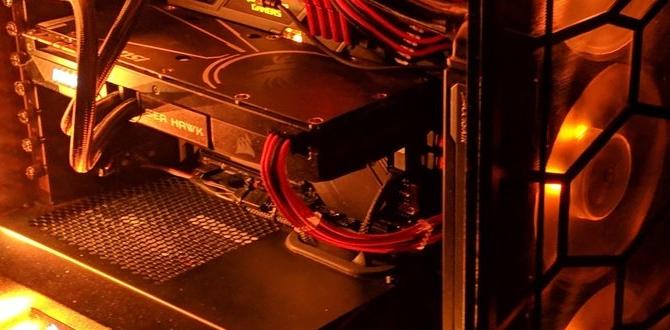Components for High-Performance Gaming PC
Graphics Card
One of the most crucial components for a high-performance gaming PC is the graphics card. It determines the visual quality and speed of your games, allowing you to play everything on ultra settings for a truly immersive experience.
Processor
The processor is the brain of your gaming PC. A powerful processor ensures smooth gameplay, fast loading times, and optimal performance for all your gaming needs.
Memory
Having sufficient memory is essential for running games smoothly. Make sure to invest in enough RAM to handle the demands of modern gaming titles.
Storage
Fast and ample storage is necessary to store your games, operating system, and other files. Consider solid-state drives for faster load times and responsiveness.
Power Supply
A reliable power supply unit is vital to ensure stable operation of your gaming PC, especially when running high-demand games on ultra settings.
Cooling System
Proper cooling is essential to prevent overheating and maintain the performance of your gaming PC. Invest in effective cooling solutions to keep your system running smoothly.
Assembly of Gaming PC
Preparation of Components
Before assembling your gaming PC, ensure all components are compatible and that you have all the necessary tools for the job.
Installing the Graphics Card
Insert the graphics card into the appropriate PCIe slot on the motherboard and secure it in place. Connect any required power cables for the card to function properly.
Mounting the Processor
Carefully install the processor into the motherboard, ensuring proper alignment and applying thermal paste for optimal heat transfer.
Connecting Memory Modules
Insert the memory modules into the designated slots on the motherboard, following the manufacturer’s guidelines for the optimal configuration.
Attaching Storage Drives
Mount your storage drives in the appropriate bays within the PC case and connect them to the motherboard using SATA cables.
Installing Power Supply
Secure the power supply unit in the designated area of the case and connect all necessary power cables to the motherboard, graphics card, and other components.
Setting Up Cooling System
Install fans or liquid cooling components to ensure proper airflow and temperature management within your gaming PC.
Software Installation and Configuration
Operating System Installation
Install your preferred operating system, ensuring all drivers are up to date for optimal performance.
Graphics Card Drivers
Download and install the latest drivers for your graphics card to ensure compatibility and performance enhancement.
Game Optimization Software
Utilize game optimization software to fine-tune settings and maximize performance for each game you play.
System Updates
Regularly update your system software to ensure security, stability, and performance improvements.
Testing and Benchmarking
Running Benchmarking Software
Run benchmarking tools to assess the performance of your gaming PC and identify any potential bottlenecks or areas for improvement.
Testing Game Performance
Test various games on ultra settings to gauge the performance of your gaming PC and make any necessary adjustments for optimal gameplay.
Overclocking (Optional)
If you’re looking to push your system to its limits, consider overclocking your components with caution to achieve higher performance levels.
Conclusion
Building a high-performance gaming PC that can play everything on ultra settings requires careful component selection, proper assembly, and thorough software configuration. By following the steps outlined in this guide, you can create a gaming rig that delivers exceptional performance and immersive gaming experiences.
FAQs
1. Can I use air cooling instead of liquid cooling for my gaming PC?
Yes, air cooling can be a cost-effective and reliable cooling solution for your gaming PC, depending on your specific needs and requirements.
2. How much RAM do I need for gaming on ultra settings?
For gaming on ultra settings, it is recommended to have at least 16GB of RAM to ensure smooth performance and multitasking capabilities.
3. What is the importance of updating graphics card drivers regularly?
Regularly updating graphics card drivers is essential to ensure compatibility with new games, fix bugs, and improve overall performance and stability.
4. Is overclocking safe for my gaming PC?
Overclocking can provide performance gains, but it can also lead to increased heat and potential hardware damage if not done correctly. Proceed with caution and monitor temperatures closely.
5. How often should I clean and maintain my gaming PC?
It is recommended to clean your gaming PC regularly, at least every few months, to prevent dust buildup and maintain optimal performance and cooling efficiency.
